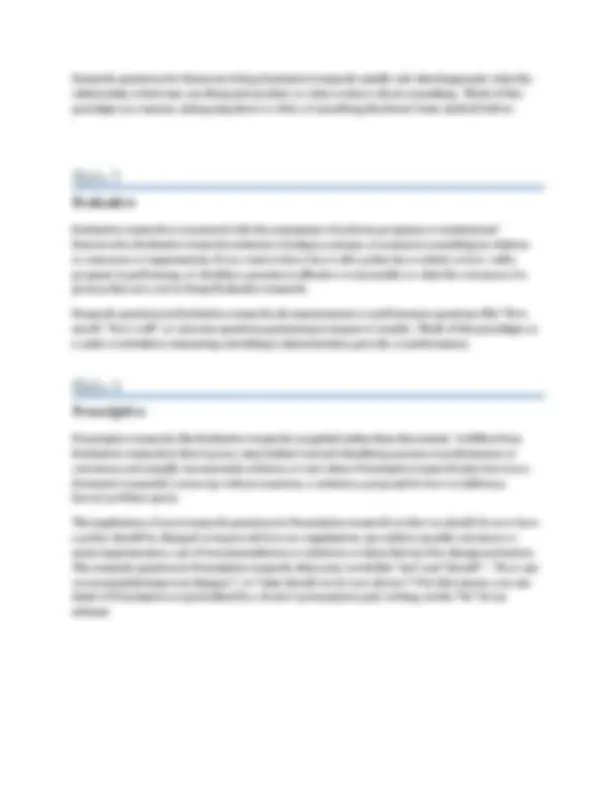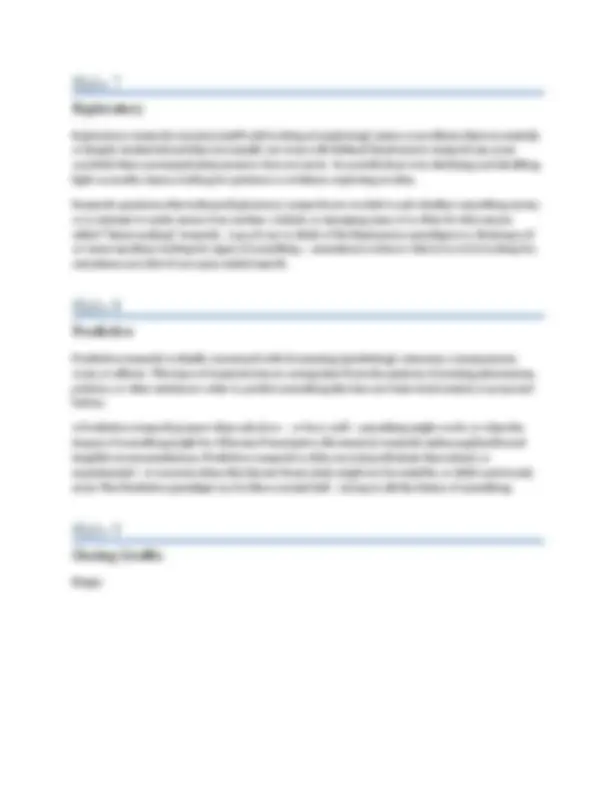




Study with the several resources on Docsity

Earn points by helping other students or get them with a premium plan


Prepare for your exams
Study with the several resources on Docsity

Earn points to download
Earn points by helping other students or get them with a premium plan
Community
Ask the community for help and clear up your study doubts
Discover the best universities in your country according to Docsity users
Free resources
Download our free guides on studying techniques, anxiety management strategies, and thesis advice from Docsity tutors
Most kinds of research fall into one of the following paradigms: Descriptive, Evaluative,. Prescriptive, Exploratory, or Predictive.
Typology: Lecture notes
1 / 4

This page cannot be seen from the preview
Don't miss anything!



Most kinds of research fall into one of the following paradigms: Descriptive, Evaluative, Prescriptive, Exploratory, or Predictive.
These paradigms have to do with the purpose of the research. Various methods can be used to do the research, but it is first useful to determine the overarching objective of the research.
In this module, we will provide a description of each paradigm and also present some examples of the kinds of research questions that are typically associated with them.
Descriptive research focuses on investigating and mapping (describing) problems, processes, relationships (especially causal relationships), or other existing phenomena.
For example, a thesis that focused on understanding how information is disseminated from a fusion center to local police departments and where the barriers exist to the flow of information would fall under this type of research. A case study – unpacking all aspects of a single event in order to identify the characteristics, dynamics, and chronology and to discern cause and effect – could also be descriptive in purpose.
Exploratory research concerns itself with looking at (exploring) issues or problems that are entirely or largely uncharted and that are usually not even well-defined. Exploratory research can even conclude that a presumed phenomenon does not exist. Its contribution is in clarifying and shedding light on murky issues, looking for patterns or evidence, exploring an idea.
Research questions that indicate Exploratory research are worded to ask whether something exists, or to attempt to make sense of an unclear, wicked, or emerging issue. It is often for this reason called “Sense-making” research. A good way to think of the Exploratory paradigm is a divining rod or sonar machine, looking for signs of something – sometimes we know what it is we’re looking for, sometimes not. But it’s an open-ended search.
Predictive research is chiefly concerned with forecasting (predicting) outcomes, consequences, costs, or effects. This type of research tries to extrapolate from the analysis of existing phenomena, policies, or other entities in order to predict something that has not been tried, tested, or proposed before.
A Predictive research project often asks how - or how well – something might work, or what the impact of something might be. Whereas Prescriptive (Normative) research makes applicable and tangible recommendations, Predictive research is often more hypothetical, theoretical, or experimental – it concerns ideas that haven’t been tried, might not be testable, or didn’t previously exist. The Predictive paradigm is a lot like a crystal ball – trying to tell the future of something.